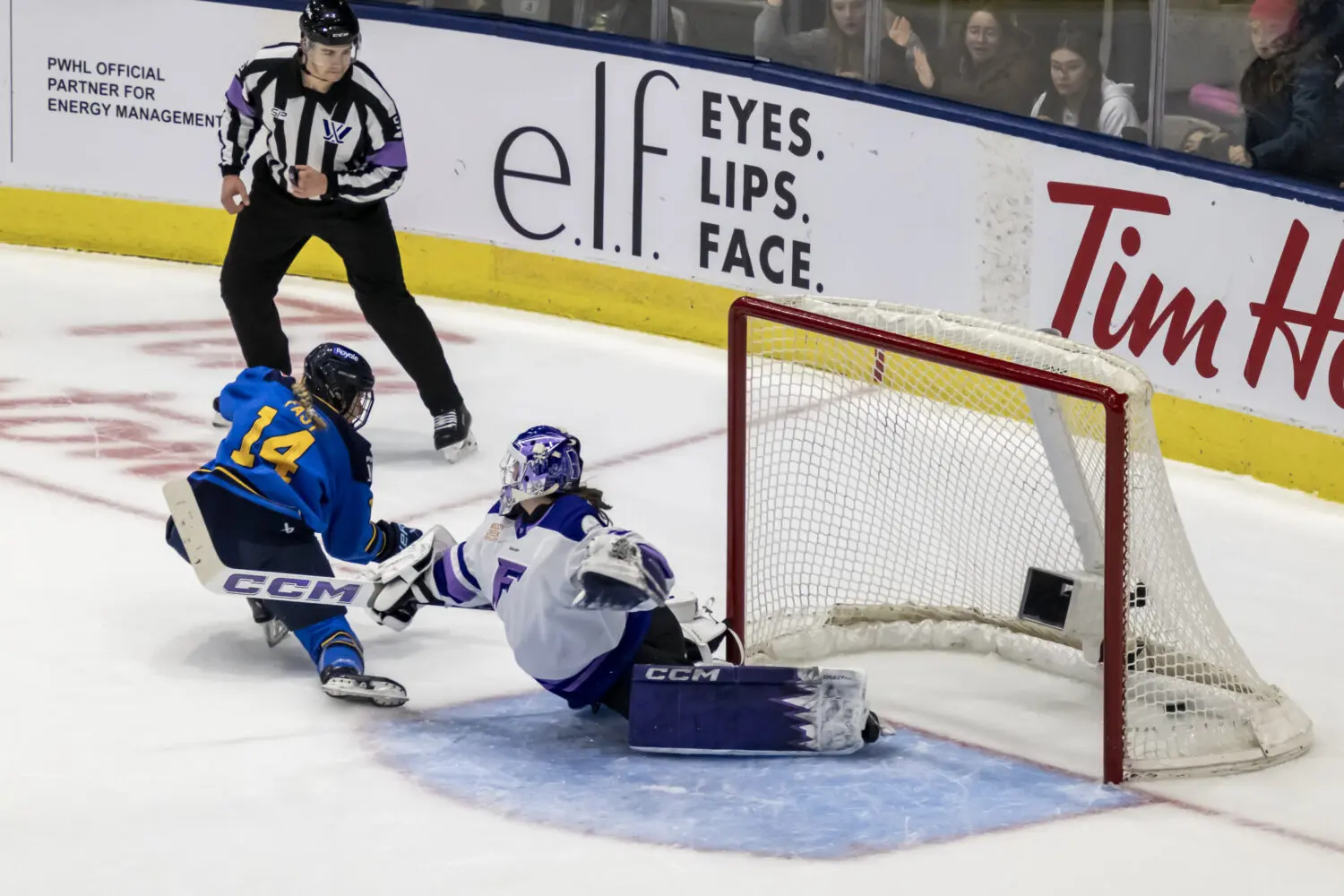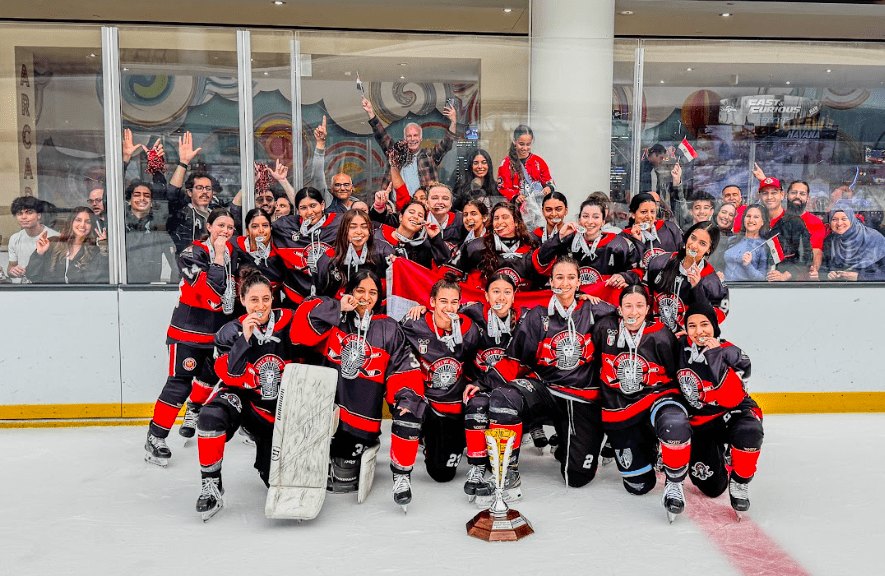
Home to an exceptional gathering of elite competitors, the chance to grace the ice for the Minnesota Whitecaps takes on a more symbolic meaning for Emma Stauber. Raised in the State of Hockey, suiting up for the Whitecaps has not only allowed Stauber a treasured opportunity to extend her playing career with many familiar faces, she is helping contribute to the growing legacy of professional women’s hockey in the United States.
Growing up in the Duluth area, Stauber would attend Bulldogs games as a youngster, aspiring to emulate the heroics of her hockey idols. Eventually getting the opportunity to play for them, it was not only the culmination of a lifelong dream come true, it allowed Stauber the chance to become the role model for a new generation of young fans.
Having logged 142 appearances with the Minnesota Duluth Bulldogs, she was just as prominent in the classroom, recognized thrice on the WCHA All-Academic Team while also gaining the 2015 WCHA Scholar-Athlete award. Bestowed the honor of serving as co-captain in her senior season, she would graduate with a major in Exercise science.
Adding an exciting dimension to Stauber’s time with the Whitecaps is the fact that many former WCHA rivals are now teammates. From the likes of former Wisconsin star goalie Alex Rigsby, to Hannah Brandt, the all-time leading scorer in Golden Gophers history, the chance to call such distinguished competitors as Whitecaps teammates presents an exceptional element of enjoyment.
As a side note, the WCHA connection would also be prevalent last season. Gracing the ice for the first professional women’s ice hockey series in Minnesota, Stauber and her Whitecaps teammates faced off against several (and familiar) Wisconsin legends, including Hilary Knight, who suited up for the visiting Boston Pride.
“Yes, it’s such an amazing opportunity to be able to play alongside former rivals. The coolest part about this situation is that yes, we all probably hated playing each other in college, but when we show up to the rink we all have something in common, which is our love for hockey.
It doesn’t matter who we play, who is on our team, or who is on our line because we come together and compete regardless. The rivalry aspect between us disappears and we become friends, teammates. Most of the time when I am out there playing with a rival, I’m happy they’re on my team because I know what could and probably would happen if they were on the other team!”
Among the Bulldogs players that Stauber cheered for in her youth was Jenny Potter (née Schmidgall), who Stauber enjoys to call a teammate. As one of the inaugural members of the Whitecaps, Potter returns to her hockey roots this season, rejoining the Whitecaps after a head coaching stint in 2015-16 with the Ohio State Buckeyes.
With due deference, getting the chance to play alongside Potter also represents a unique aspect of six degrees of separation in Stauber’s hockey career. Of note, her uncle, Robb Stauber (a Hobey Baker Award winner) spent parts of four seasons with the Los Angeles Kings during the magical Wayne Gretzky era, employing a backup role to Kelly Hrudey. Among his teammates was Tony Granato, whose sister Cammi played alongside Potter at the 1998 Nagano Winter Games (which saw Gretzky play for the Canadian men’s team), capturing gold in the first-ever women’s ice hockey event at the Games.
The impact of Nagano extends far beyond Stauber calling Potter a teammate. During her career with the Bulldogs, her head coach was Shannon Miller, who served as Canada’s bench boss at the Nagano Games. In addition, Bulldogs assistant coach Laura Schuler (who is in her debut season as the head coach at Dartmouth) played for Team Canada at Nagano, capturing a silver medal.
Taking into account that Robb Stauber served as the goaltending coach for women’s Team USA at the 2014 Sochi Winter Games, it only adds to the profound sense of connection. Along with her father Jamie, Stauber has found a tremendous amount of inspiration, helping set the stage for the proud career to come,
“My Uncle Robb has always been a huge support system for me throughout my hockey career. He and my dad were the ones I always had conversations with during my ups and downs throughout college in terms of talking hockey. On many occasions, my Uncle Robb saw the game or certain situations differently than me, I’m assuming because he was a goalie. But regardless, we both have learned a lot from each other.
We would spend countless minutes on the phone going over the good things I did during a game, the mistakes I made, the things to continue to do, and things I should work on. We didn’t always agree on everything, but I have definitely learned to be more open to different techniques, strategies, and systems in order to become a better player by having him as a mentor.
The most important thing he taught me was to make a decision without hesitation. If I see a play, make it, and adjust accordingly. If you hesitate, it usually means it’s probably not the best play. Over the years, I have tried to see the ice differently in that respect and not beat myself up over decisions I made.”
Such a strong sense of support and loyalty would extend into Stauber’s career with the Bulldogs, where she was known for her solid work ethic and strong sense of loyalty. As a side note, she would also display a strong character. Making the Bulldogs roster as a walk-on, her background involved an offensive proficiency from the blueline. Showing a true sense of teamwork, she would occupy a more defensive role, blossoming into a key member on special teams, anchoring the power play. Such a role proved that one does not have to score to make winning contributions,
“Coming from the State of Hockey, Minnesota, it was an honor to be able to play for such a respectable elite program like UMD, especially since Duluth is my hometown. One of the best things about playing for the Bulldogs is that every weekend is a battle. The WCHA is without a doubt one of the toughest leagues in the country in women’s hockey and as a team you had to show up and be prepared to play regardless of the opponent.
The level of competition within the WCHA demands that players step up and play to their fullest potential, which ultimately helps ramp up the intensity of women’s hockey year after year. Now that I have graduated, I am lucky to be able to play for the Minnesota Whitecaps. When we graduate from college most of us aren’t ready to hang up the skates and that was the case for me.
When you put so much time, energy, and focus into something, it’s hard to let go. The Minnesota Whitecaps organization is trying to help younger girls dream bigger than they have been able to before in regards to their hockey playing careers. The same goes with the NWHL and the CWHL.”
While the Whitecaps certainly brings Stauber’s career full circle, there is also an element of balance. Away from the ice, Stauber’s academic pursuits have brought her to another region of the United States that is an exceptional hub for elite women’s ice hockey talent.
Attending Northeastern University in Boston, one of the benefits of her post-graduate studies may be the strengthening of her solid leadership skills, while allowing her to take on a more prominent role in her hockey ambitions. Coincidentally, one of her teammates on the 2016-17 edition of the Whitecaps in Kendall Coyne, who starred at Northeastern for four seasons and played on the US women’s team at Sochi 2014.
“Yes, I am pursuing my Master’s in Sports Leadership at Northeastern University. The first few classes I took were leadership orientated and now I have a few classes that are more orientated towards concepts like sport management, event management, media relations, and NCAA compliance. I have been able to apply all of my classes in some way to my life as a player and coach.
The leadership classes have really helped me recognize the different leadership styles people gravitate towards and when I am playing for a coach I am able to distinguish their personal leadership style, how they typically think, and I can start to predict how they may act or respond in different situations.
I have also found what leadership style works best for me by receiving positive responses from my players. The other classes like sport management have come in handy now that I have started as an assistant coach for my former high school girl’s varsity hockey team. These classes focus on the detail and behind the scenes work that goes into running a program and it’s really fun being able to apply those concepts in real life.”
“All quotes obtained first hand unless otherwise indicated”
Photo credit: Brent Cizek Photography
[adrotate group=”1″]
Related Articles
Categories
Recent Posts
[adrotate group=”2″]




